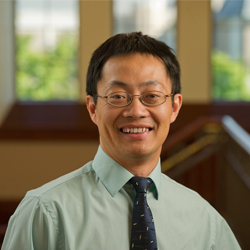Siyuan Zhang Adjunct Associate Professor

Research Interests:
Exploring the co-evolution between tumor cells and tumor microenvironment is the central theme of my laboratory. Using the state-of-art single cell level sequencing and multiphoton based intravital imaging, we aim to reveal the in-depth molecular mechanisms of tissue dynamics during the early tumor development, drug resistance and metastasis colonization. Base on our pre-clinical findings, we also conduct pre-clinical testing of novel combinatorial therapies to overcome drug resistance and prevent tumor metastasis.
We are focusing on perfecting in vivo model system and integrating innovative approaches to faithfully model and investigate dynamic interaction between tumor and its tumor microenvironment at single cell level. We have developed intravital multiphoton imaging and tissue clearing-based whole tissue imaging techniques, which allow us to explore the spatiotemporal dynamics of tumor and tumor microenvironment in situ at cellular and subcellular level. We have also established single cell-based RNA-seq pipeline, which enables us to map the single cell level transcriptome dynamics at the early tumor development and metastatic colonization. We aim to tackle the overarching challenge of studying early tumor/metastasis development in situ and gain unprecedented mechanistic insights of the role of tumor microenvironment during the cancer progression in its native pathophysiological microenvironment. Three specific research themes in my laboratory are:
1. What are the critical changes during the first moment of metastatic seeding and colonization? Can we exploit those changes as novel therapy to prevent metastatic outgrowth?
2. How heterogeneous tumor responses to environmental stress, such as drug treatment, differently? How the tumor microenvironment primes “seemingly” normal tissue and promotes an accelerated tumor development and acquired drug resistance?
3. Can we systematically delineate tumor and tumor microenvironment genetically and morphologically in situ?
Biography:
- Associate Professor, Department of Pathology, UT Southwestern Medical Center, Dallas, Texas 2022 - present
- Adjunct Professor, Department of Biological Sciences, University of Notre Dame, Notre Dame, Indiana 2022 - present
- Associate Professor, Department of Biological Sciences University of Notre Dame, Notre Dame, Indiana 2018- 2022
- Assistant Professor, Department of Biological Sciences, University of Notre Dame, Notre Dame, Indiana 2012 - 2018
- Adjunct Assistant Professor, Department of Biochemistry and Molecular Biology, Indiana University School of Medicine, Indianapolis, Indiana 2012 - 2018
- Instructor, Department of Molecular and Cellular Oncology, The University of Texas M.D. Anderson Cancer Center, Houston, Texas 2011 - 2012
- Postdoctoral Fellow, Department of Molecular and Cellular Oncology, The University of Texas M.D. Anderson Cancer Center, Houston, Texas 2007 - 2011
- Research Associate, Department of Community, Occupational and Family Medicine, National University of Singapore, Republic of Singapore 2005 - 2006
- Research and Teaching Instructor, Department of Toxicology, Peking University Health Science Center, Beijing, China 1998 - 2000
Selected Publications:
- Golomb SM, Guldner IH, Zhao A, Wang Q, Palakurthi B, Aleksandrovic EA, Lopez J, Lee WS, Yang K, Zhang S. Multi-modal single cell analysis reveals brain immune landscape plasticity during aging and gut microbiota dysbiosis. Cell Reports 2020 Dec 1; 33(9): 108438 https://doi.org/10.1101/2020.07.15.205377 [Full text].
- Guldner, I.H., Wang, Q., Yang, L., Golomb, S.M., Zhao, A., Lopez, J.A., Brunory, A., Howe, E.N., Zhang, Y., Palakurthi, B., Barron, M., Gao, H., Xuei, X., Liu, Y., Li, J., Chen, D.Z., Landreth, G.E., Zhang, S.. 2020. CNS-Native Myeloid Cells Drive Immune Suppression in the Brain Metastatic Niche through Cxcl10. Cell 2020 Nov 25;183(5):1234-1248.e25. doi: 10.1016/j.cell.2020.09.064.
- Howe EN, Burnette MD, Justice ME, Clancy JW, Guldner IH, Schnepp PM, Hendrick V, Aryal UK, Specht AT, Li J, D'Souza-Schorey C, Zartman JZ, and Zhang S. Rab11b-mediated integrin recycling promotes brain metastatic adaptation and outgrowth. (in press) Nat Commu. 2020. BioRxiv 666750.
- Wang Q, Guldner IH, Golomb SM, Sun L, Harris J, Lu X, and Zhang S. Single-cell profiling guided combinatorial immunotherapy for fast-evolving CDK4/6 inhibitor resistant HER2-positive breast cancer. Nat Commun. 2019 Aug 23;10(1):3817. doi: 10.1038/s41467-019-11729-1. PubMed PMID: 31444334; PMCID: PMC6707314.
- Ni, Y., Schmidt, K.R., Werner, B.A., Koenig, J.K., Guldner, I.H., Schnepp, P.M., Tan, X., Jiang, L., Host, M., Sun, L., Howe, E.N., Wu, J., Littlepage, L.E., Nakshatri, H., Zhang, S.,2019. Death effector domain-containing protein induces vulnerability to cell cycle inhibition in triple-negative breast cancer. Nat. Commun.10, 2860. https://doi.org/10.1038/s41467-019-10743-7.
- Rodriguez, K.X., Howe, E.N., Bacher, E.P., Burnette, M., Meloche, J.L., Meisel, J., Schnepp, P., Tan, X., Chang, M., Zartman, J. *, Zhang, S.*, Ashfeld, B.L. *, 2019. Combined Scaffold Evaluation and Systems-Level Transcriptome-Based Analysis for Accelerated Lead Optimization Reveals Ribosomal Targeting Spirooxindole Cyclopropanes. ChemMedChem.https://doi.org/10.1002/cmdc.201900266 *:co-corresponding authors.
- Zhang, Y., Nichols, E.L., Zellmer, A.M., Guldner, I.H., Kankel, C., Zhang, S., Howard, S.S., Smith, C.J., 2019. Generating intravital super-resolution movies with conventional microscopy reveals actin dynamics that construct pioneer axons. Development.Camb. Engl. 146.https://doi.org/10.1242/dev.171512.
- Yue, X., Nguyen, T.D., Zellmer, V., Zhang, S., Zorlutuna, P., 2018. Stromal cell-laden 3D hydrogel microwell arrays as tumor microenvironment model for studying stiffness dependent stromal cell-cancer interactions. Biomaterials170, 37–48. https://doi.org/10.1016/j.biomaterials.2018.04.001.
- Barron, M., Zhang, S., Li, J., 2018. A sparse differential clustering algorithm for tracing cell type changes via single-cell RNA-sequencing data. Nucleic Acids Res.2018 Feb 16;46(3):e14. [IF: 10.162].
- This work was conceived, performed, and completed in the Li lab (Dept. of ACMS at Notre Dame). I contributed to original biology concept discussion and guided data analysis. I also contributed to manuscript writing.
- Schnepp, P.M., Lee, D., Guldner, I.H. @, Palakurthi, B. @, Eckert, K.E., Toni, T.A., Ashfeld, B.L., Zhang, S., 2017. GAD1 Upregulation Programs Aggressive Features of Cancer Cell Metabolism in the Brain Metastatic Microenvironment. Cancer Res.Jun 1;77(11):2844-2856.